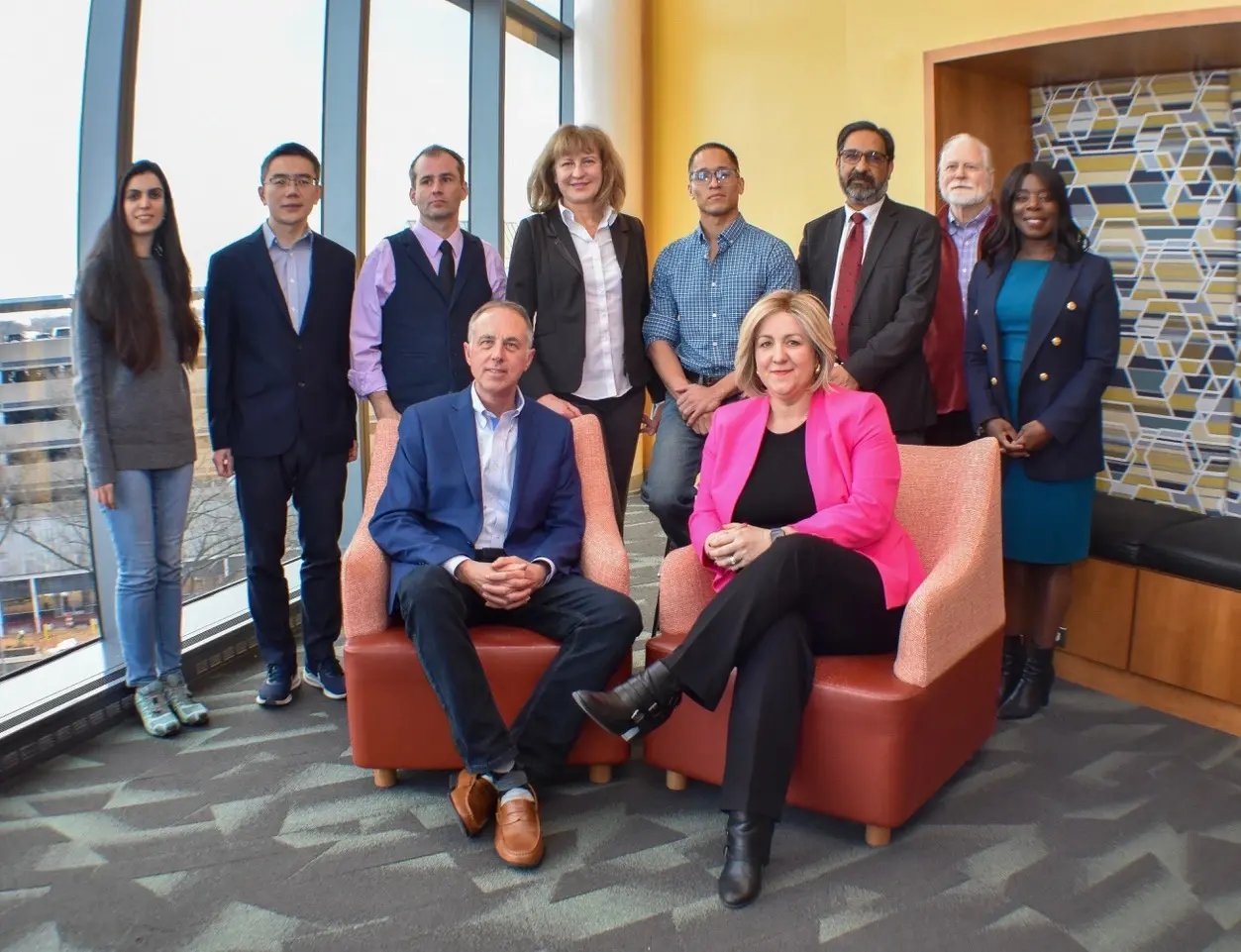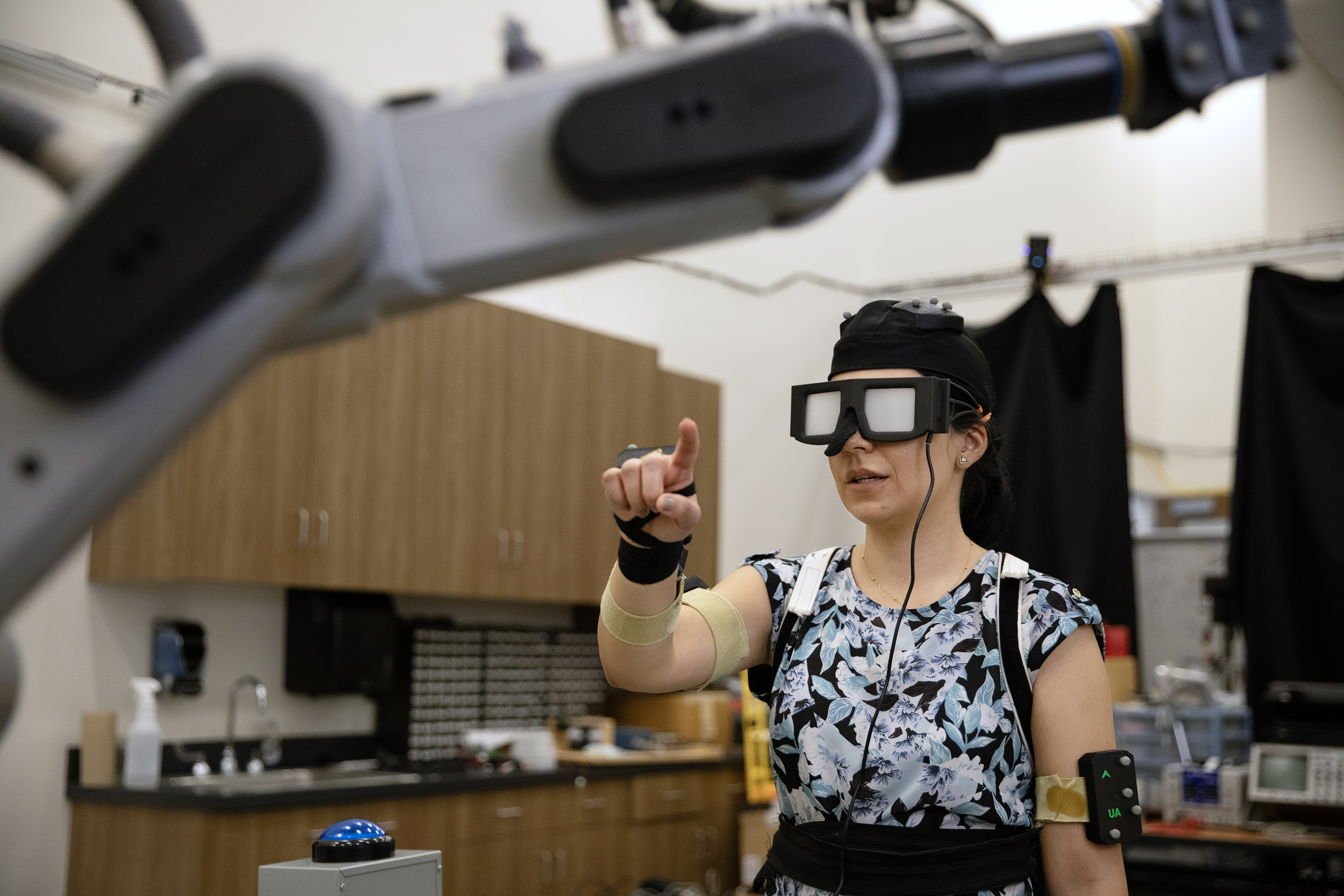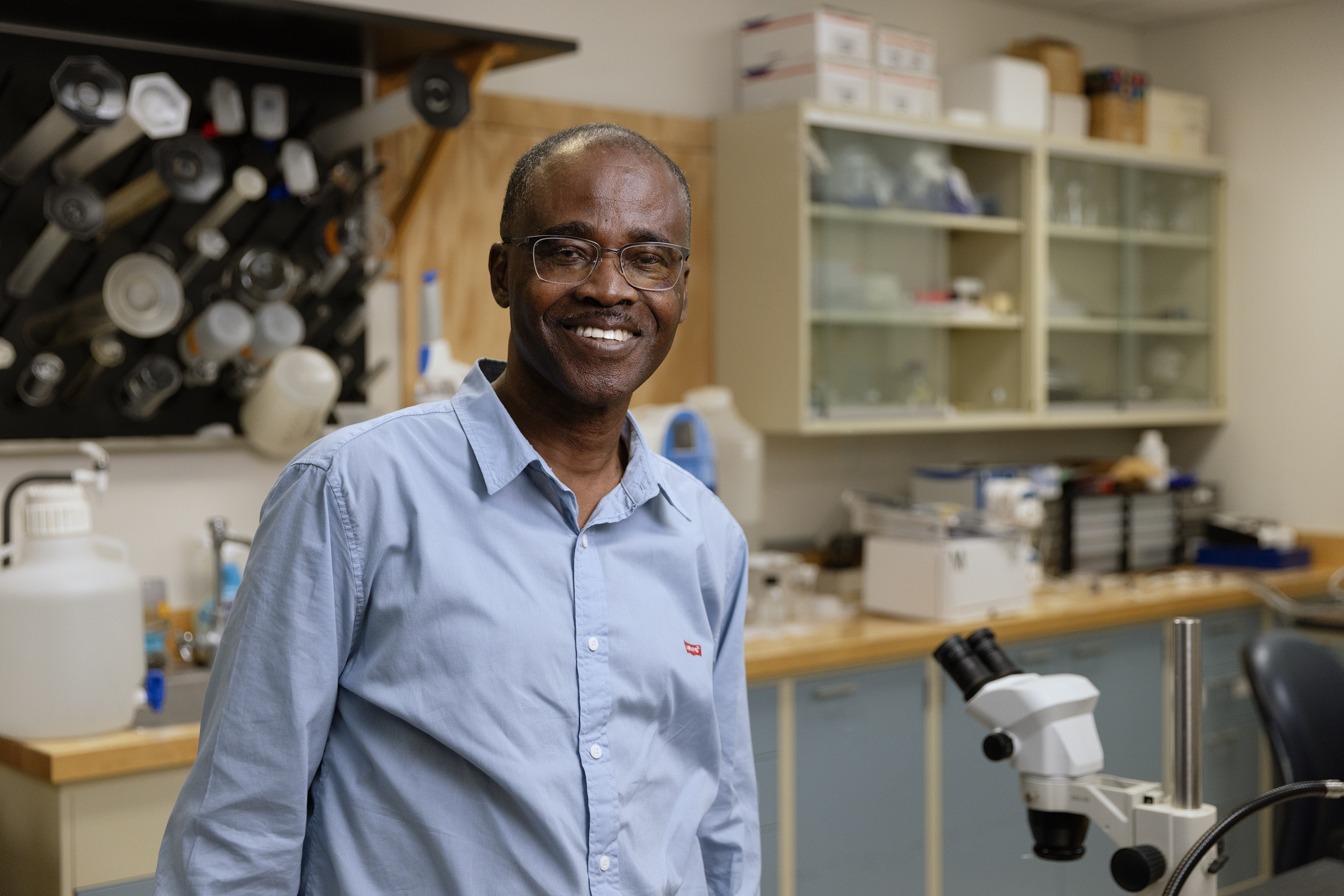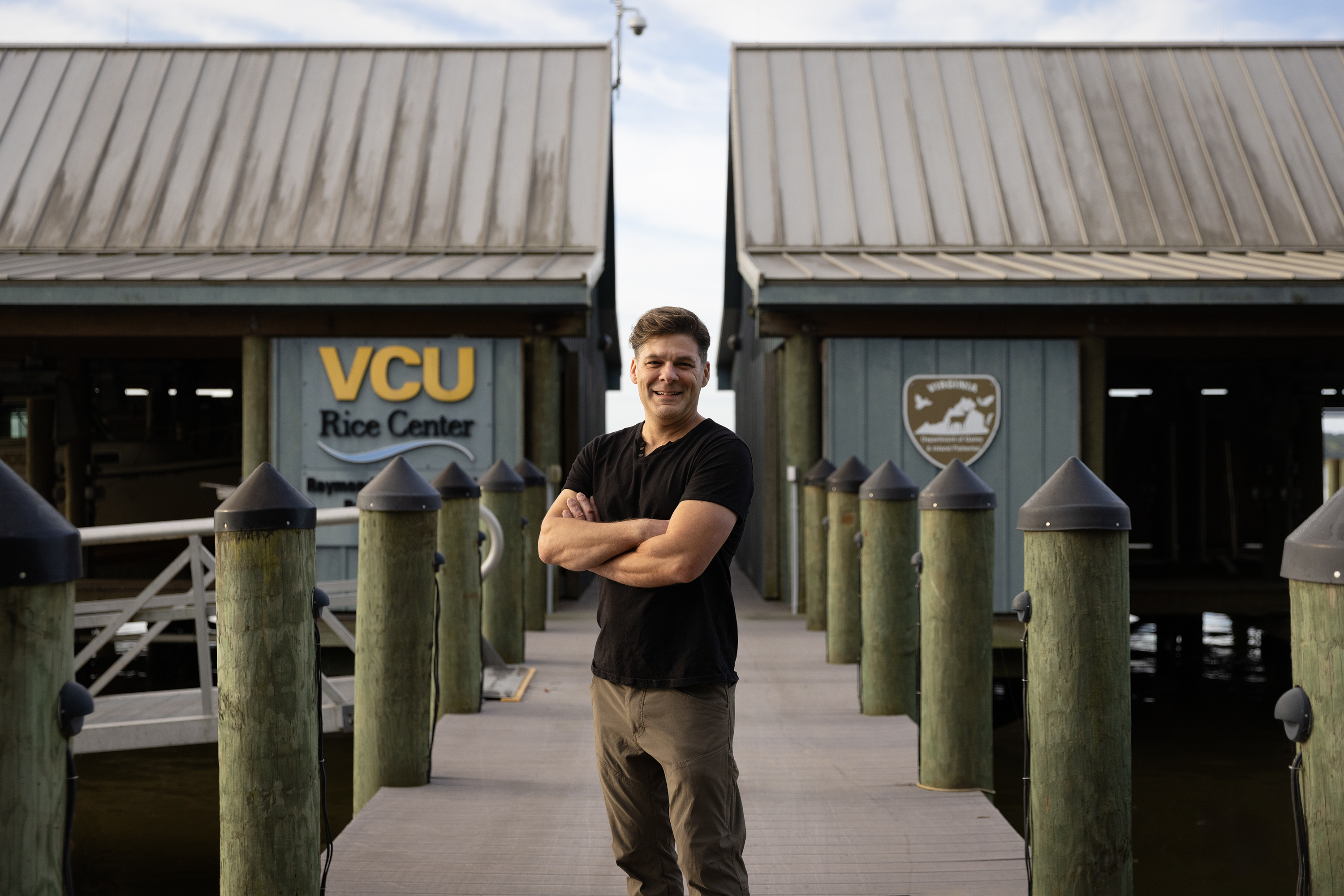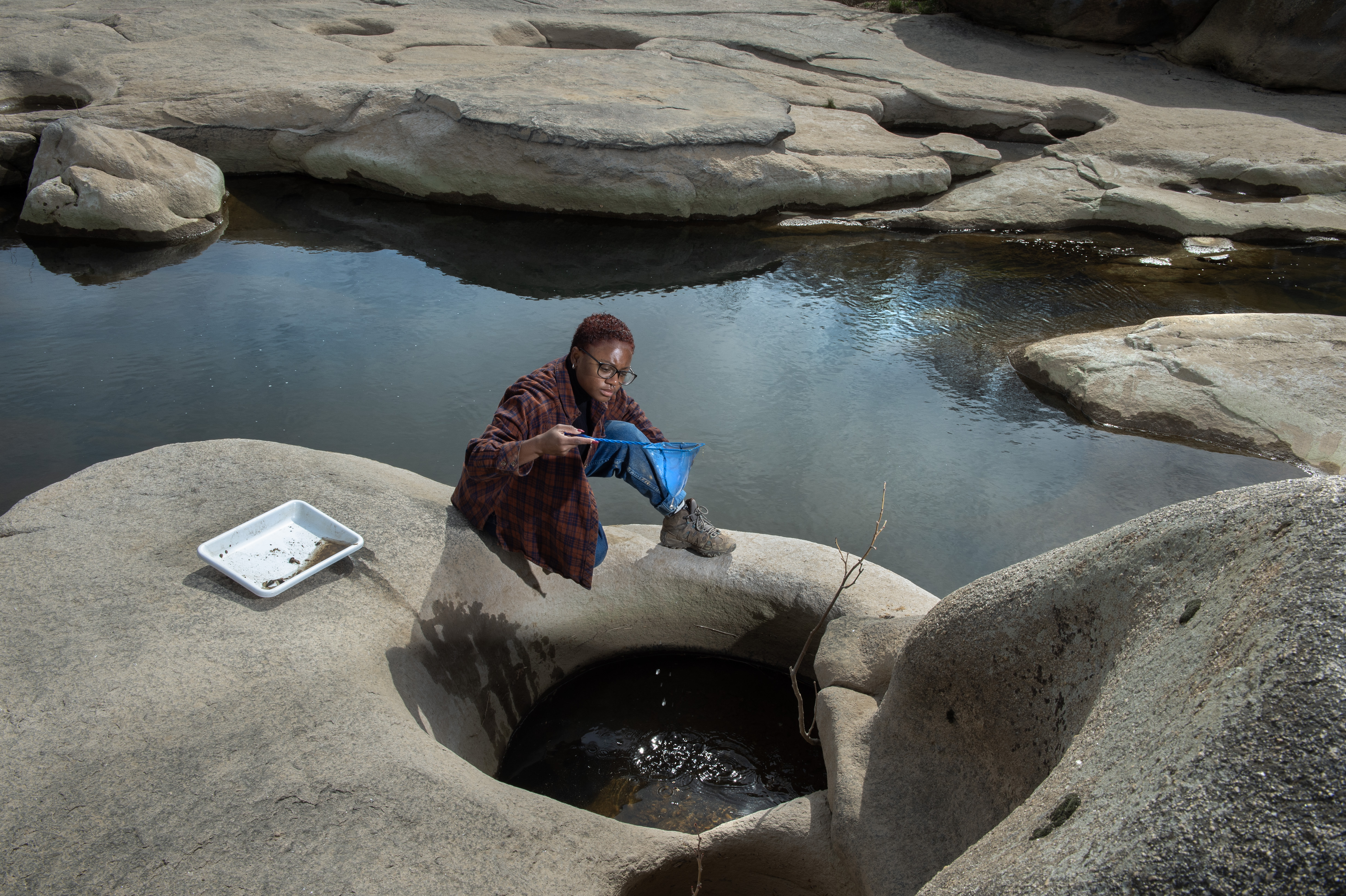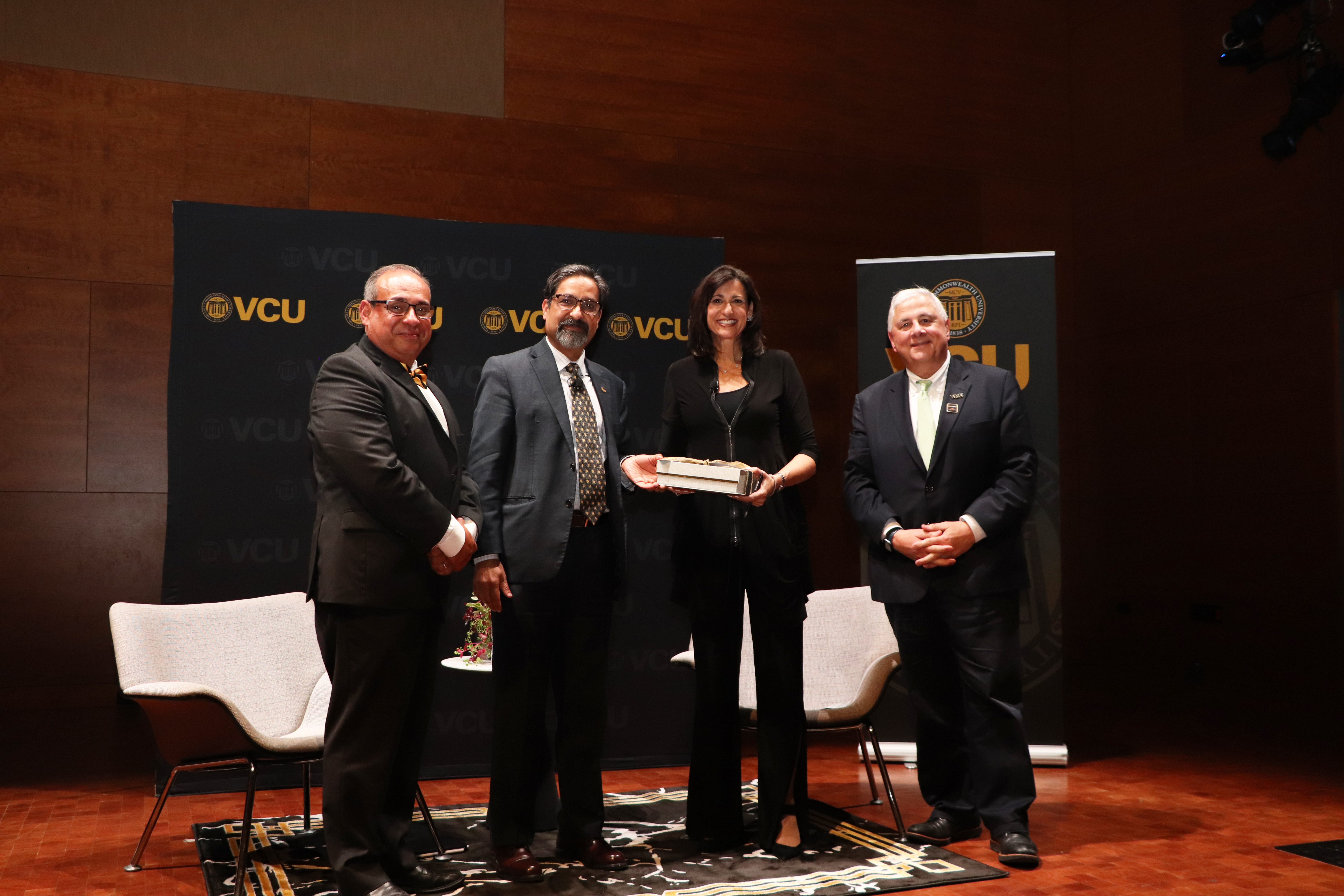VCU School of Pharmacy professor Martin Safo, Ph.D., is researching a therapy that could be useful for treating sickle cell disease
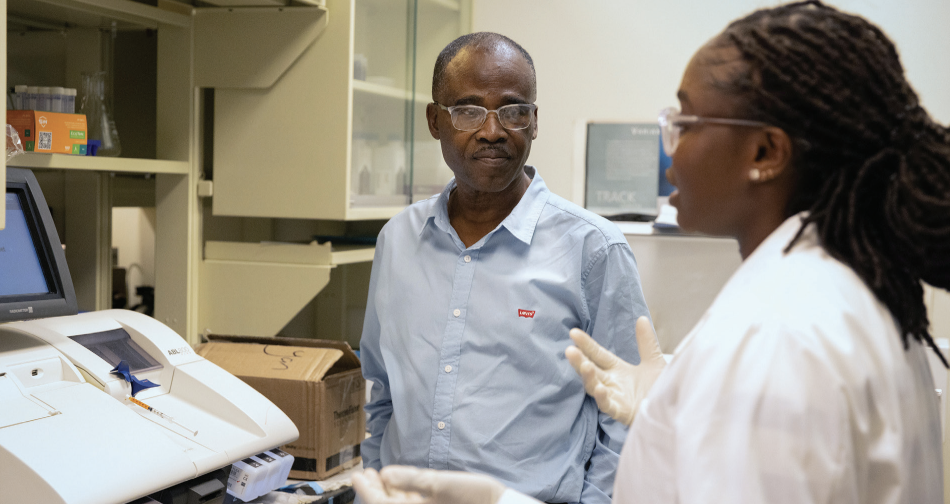
Sickle cell disease is a hereditary blood disorder, affecting over 75,000 people in the United States and millions of people worldwide. In SCD, a mutation in the ß-globin protein of hemoglobin causes deoxygenated sickle hemoglobin to form insoluble polymers inside red blood cells which deform into rigid shapes or sickle red blood cells that occlude capillaries and small blood vessels. Martin Safo and research team are using structure-based drug design, including X-ray crystallography, molecular modeling, synthesis and biological evaluation to discover hemoglobin allosteric effectors and/or covalent modifiers that may be useful for treating SCD. Hear from Dr. Safo firsthand about this drug therapy and how it will treat individuals who are affected by sickle cell disease.
Our drug prevents most of the adverse effects of the disease … Our drug will become a first line treatment and become a functional cure.
New study shows liver patients see benefits after going meatless for one meal
 VCU gastroenterologist Jasmohan Bajaj, M.D. and research team found that a single meatless meal can lower harmful ammonia levels in people with liver cirrhosis.
VCU gastroenterologist Jasmohan Bajaj, M.D. and research team found that a single meatless meal can lower harmful ammonia levels in people with liver cirrhosis.
Bajaj found that substituting one meat-based meal with a vegan or vegetarian option significantly reduced ammonia production, which can lead to cognitive decline and other serious complications. This simple dietary change could potentially benefit patients with cirrhosis without requiring drastic long-term dietary modifications.
When cells touch, their genetics change – and in pinpointing how, VCU researchers may open a new front in understanding cancer
 Rajan Gogna, Ph.D., an assistant professor in the VCU School of Medicine’s Department of Human and Molecular Genetics is leading a study to develop an innovative method to track how neighboring cells influence each other's gene expression.
Rajan Gogna, Ph.D., an assistant professor in the VCU School of Medicine’s Department of Human and Molecular Genetics is leading a study to develop an innovative method to track how neighboring cells influence each other's gene expression.
Published in the Proceedings of the National Academy of Sciences, this study is the first to uncover genetic changes due to cell interactions. Using RNA sequencing and AI, researchers identified genetic signatures from small cell clusters, confirming their model with eye lens and neural progenitor cells. This approach can be applied to cancer research, potentially improving understanding of cancer cell interactions and aiding the development of targeted therapies.
Recent albuterol shortage sparks VCU study on improving the manufacturing process
 James Ferri, Ph.D., from VCU's Department of Chemical and Life Science Engineering is leading a research project to improve the manufacturing process for albuterol. Ferri and his research team are investigating the manufacturing challenges causing a shortage of liquid albuterol in the U.S.
James Ferri, Ph.D., from VCU's Department of Chemical and Life Science Engineering is leading a research project to improve the manufacturing process for albuterol. Ferri and his research team are investigating the manufacturing challenges causing a shortage of liquid albuterol in the U.S.
Their $5 million FDA-funded project aims to streamline albuterol production through continuous manufacturing methods. By transitioning from batch processing to continuous flow, they seek to enhance efficiency, reduce costs and decentralize production, ensuring stable drug supply amid disruptions. This research not only addresses immediate shortages but also pioneers advanced manufacturing techniques in pharmaceuticals, promising broader impacts on drug availability, quality and sustainability in the healthcare sector.
VCU-led study finds discrimination over time leads to poor sleep
 Discrimination adversely affects sleep quality, as revealed by a recent longitudinal study led by Natalie D. Dautovich, Ph.D., an associate professor in the Department of Psychology of VCU’s College of Humanities and Sciences. Published in Sleep Health, the research highlights that chronic discrimination heightens sleep problems over a decade. Individuals facing discrimination experience difficulties falling asleep, increased nighttime awakenings and overall poorer sleep quality due to heightened social anxiety and distrust.
Discrimination adversely affects sleep quality, as revealed by a recent longitudinal study led by Natalie D. Dautovich, Ph.D., an associate professor in the Department of Psychology of VCU’s College of Humanities and Sciences. Published in Sleep Health, the research highlights that chronic discrimination heightens sleep problems over a decade. Individuals facing discrimination experience difficulties falling asleep, increased nighttime awakenings and overall poorer sleep quality due to heightened social anxiety and distrust.
The study underscores how social disconnection and anxiety disrupt the ability to relax and achieve restorative sleep. Dautovich emphasizes that feeling safe and socially connected is crucial for healthy sleep, shedding light on the broader impacts of discrimination on physical and mental well-being.
The opioid epidemic cost Virginians $5 billion in 2021, new data shows
 Rajan Gogna, Ph.D., an assistant professor in the VCU School of Medicine’s Department of Human and Molecular Genetics is the lead author in new research that shows the opioid epidemic's financial toll on Virginia is far greater than previously estimated.
Rajan Gogna, Ph.D., an assistant professor in the VCU School of Medicine’s Department of Human and Molecular Genetics is the lead author in new research that shows the opioid epidemic's financial toll on Virginia is far greater than previously estimated.
Updated data reveals nearly 150,000 Virginians struggled with opioid addiction in 2021, costing the state over $5 billion. This research can lay the groundwork for providing crucial data that informs future comprehensive and effective responses to the opioid crisis in Virginia.
3D-printed hairs: Ph.D. candidate, professor developing tiny sensors to detect flow and environmental changes
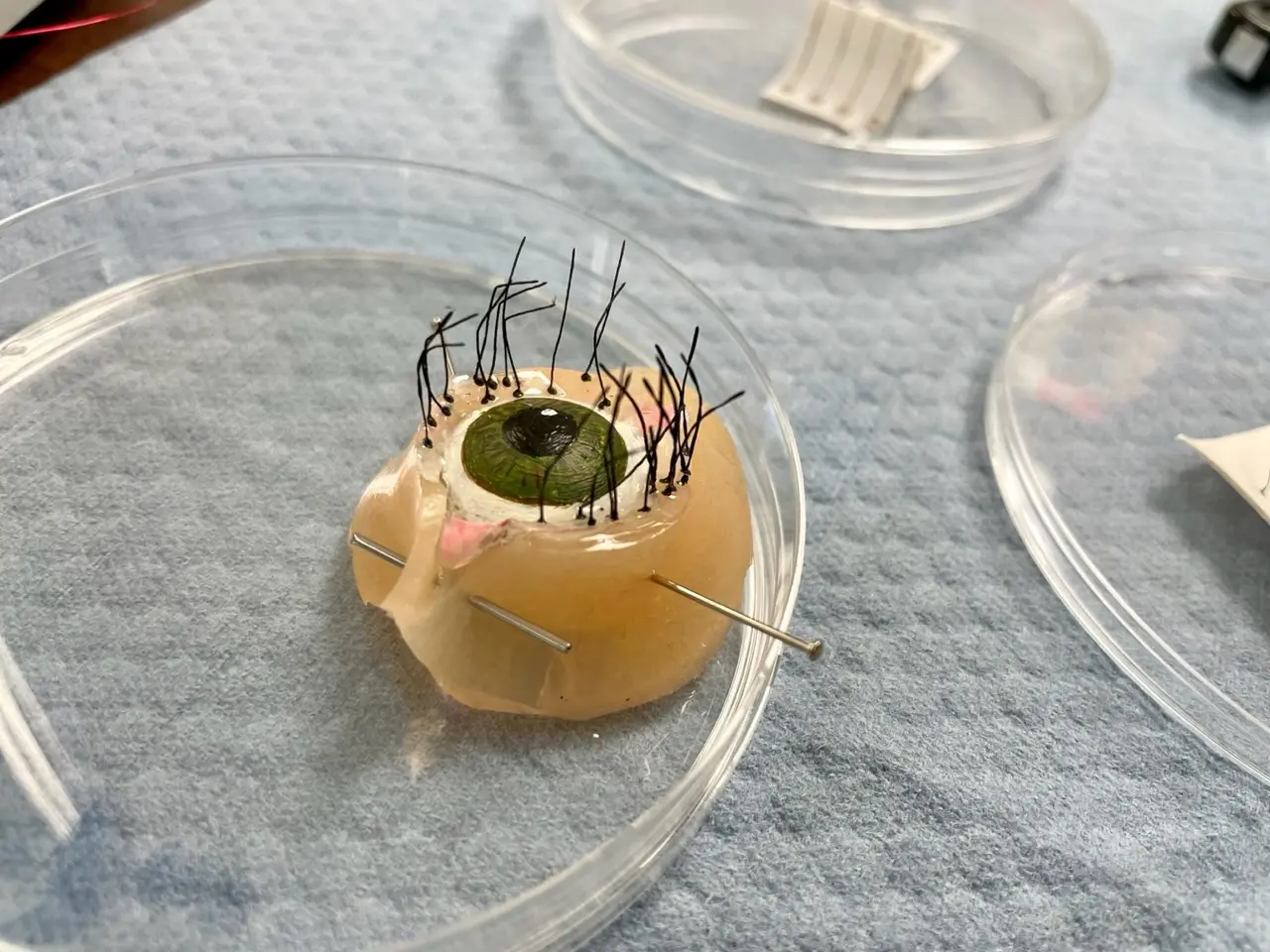 VCU doctoral candidate Phillip Glass and advisor Daeha Joung, Ph.D., are developing 3D-printed cilia sensors inspired by human mechanosensing. These sensors, made from polycaprolactone and graphene, detect various stimuli like touch, pressure and temperature.
VCU doctoral candidate Phillip Glass and advisor Daeha Joung, Ph.D., are developing 3D-printed cilia sensors inspired by human mechanosensing. These sensors, made from polycaprolactone and graphene, detect various stimuli like touch, pressure and temperature.
Their innovation lies in sensing "sliding" forces, similar to the sensation of clothing against skin. These eyelash-like cilia sensors can inspire future applications such as surgical robots and prosthetics to industrial machines measuring air and water flow. The team is now seeking partners to commercialize these versatile mechanosensors.
VCU researcher to be awarded grants totaling more than $6.3M to fight pediatric cancers
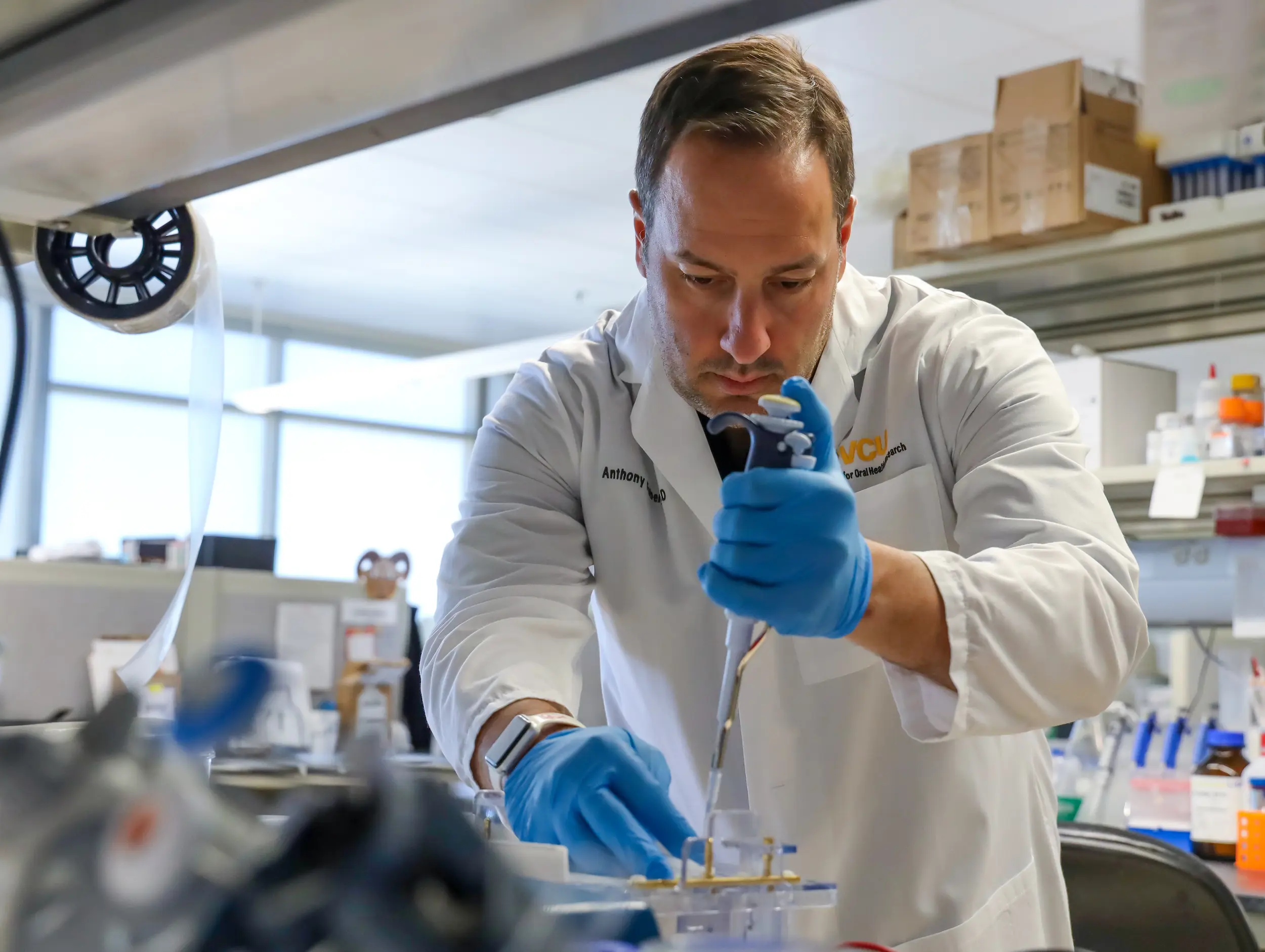 Anthony Faber, Ph.D., of VCU School of Dentistry and Massey Comprehensive Cancer Center, was awarded over $6.3 million in grants for developing targeted therapies for neuroblastoma and synovial sarcoma, rare cancers in children and young adults. Funded by the National Cancer Institute and the Department of Defense, the research focuses on transcriptional modifiers.
Anthony Faber, Ph.D., of VCU School of Dentistry and Massey Comprehensive Cancer Center, was awarded over $6.3 million in grants for developing targeted therapies for neuroblastoma and synovial sarcoma, rare cancers in children and young adults. Funded by the National Cancer Institute and the Department of Defense, the research focuses on transcriptional modifiers.
When cells replicate, a process of transcription takes place where a segment of DNA, which contains the information needed for cellular replication, is copied into RNA. The proteins that help monitor and control this process are known as transcriptional modifiers. In cancer, these proteins are often erroneously altered, leading to the development of cancer. Faber's team will explore ferroptosis inducers and SUMOylation inhibitors, drugs showing promise against these cancers. The goal is to complement existing treatments and advance these drugs to clinical trials, leveraging collaborations with global experts to offer new hope to patients.
How does exercise affect the health of women and men differently?
 Danielle Kirkman, Ph.D., an assistant professor in the VCU Department of Kinesiology and Health Sciences in the College of Humanities and Sciences suggests women may benefit more from exercise than men in new research study.
Danielle Kirkman, Ph.D., an assistant professor in the VCU Department of Kinesiology and Health Sciences in the College of Humanities and Sciences suggests women may benefit more from exercise than men in new research study.
Women achieved similar health benefits with less exercise compared to men in the study, which suggests that sex differences in hormones and physiology plays a role in how exercise affects everyone differently. This research contributes to a better understanding of the relationship between exercise, sex and longevity. Although the current exercise guidelines aren’t tailored to the different genders, this research could lead to the development of sex-specific exercise guidelines, optimizing health benefits for all genders.
Drug candidate shows promise in easing chronic pain, new study finds
 Aron Lichtman, Ph.D., and Hamid Akbarali, Ph.D., both professors in VCU School of Medicine’s Department of Pharmacology and Toxicology, are a part of a team of experts developing a potential new drug to treat chronic pain.
Aron Lichtman, Ph.D., and Hamid Akbarali, Ph.D., both professors in VCU School of Medicine’s Department of Pharmacology and Toxicology, are a part of a team of experts developing a potential new drug to treat chronic pain.
The drug targets a specific enzyme involved in inflammation, reducing pain without affecting brain reward pathways, unlike opioids. This non-addictive approach could offer a safer and more effective treatment option for millions suffering from chronic pain reducing the overall medical reliance on opioids.
VCU researchers awarded $3M to study early signs of dementia
 Lana Sargent, Ph.D., interim associate dean for practice and community engagement at the School of Nursing, and Jane Chung, Ph.D., an associate professor in the School of Nursing’s Department of Family and Community Health Nursing are co-leading a study that is researching the link between mobility and dementia in older adults.
Lana Sargent, Ph.D., interim associate dean for practice and community engagement at the School of Nursing, and Jane Chung, Ph.D., an associate professor in the School of Nursing’s Department of Family and Community Health Nursing are co-leading a study that is researching the link between mobility and dementia in older adults.
The team believes changes in physical activity patterns may be early indicators of cognitive decline. By tracking participants' movements using wearable devices, they aim to identify potential predictors of dementia and develop early intervention strategies, transforming the way dementia is diagnosed and treated.
VCU researchers explore a promising pathway to treating fibrosis
 Postdoctoral fellow Maggie Freeberg, Ph.D., and Patricia Sime, M.D., chair of the Department of Internal Medicine at the School of Medicine, are part of a multidisciplinary team studying treatment and a possible cure for fibrosis.
Postdoctoral fellow Maggie Freeberg, Ph.D., and Patricia Sime, M.D., chair of the Department of Internal Medicine at the School of Medicine, are part of a multidisciplinary team studying treatment and a possible cure for fibrosis.
Building on Nobel Prize-winning research, the team is investigating the role of a protein called Piezo2 in lung scarring. By blocking this protein, they aim to develop drugs that can prevent or reverse fibrosis in the lungs and potentially other organs.


